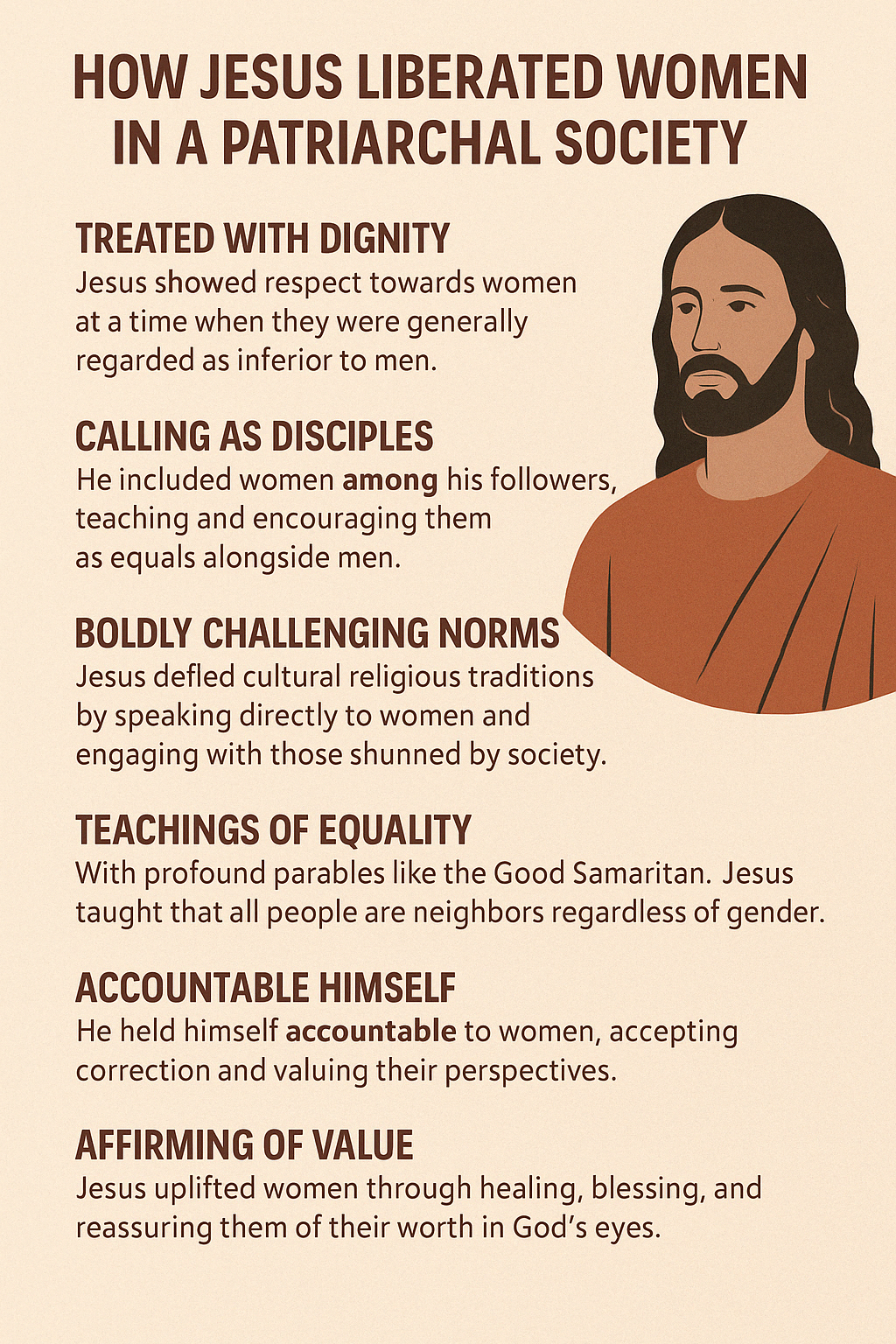How Jesus Liberated Women in the New Testament: A Revolutionary Shift in a Patriarchal World
Introduction: A Culture of Patriarchy
In first-century Judea, women were widely marginalized, regarded as inferior to men in both religious and social status. They were often excluded from religious instruction, confined to domestic roles, and their testimony was deemed unreliable in courts. Into this world came Jesus of Nazareth—a figure who not only challenged the religious authorities but also radically elevated the status of women in ways that were counter-cultural and spiritually liberating.
Jesus Saw Women as Worthy of Direct Teaching
While rabbis in that era generally refused to teach women, Jesus broke tradition. He openly taught women, honored their intellect, and engaged them in theological discussions.
- Example: Mary of Bethany – In Luke 10:38-42, Mary sits at Jesus’ feet—an action reserved for male disciples learning from a rabbi. Jesus affirms her choice, saying, “Mary has chosen the better part, and it will not be taken from her.”
- Example: The Samaritan Woman at the Well – In John 4, Jesus initiates a deep theological discussion with a woman, breaking three taboos: she was a Samaritan, a woman, and a known sinner. He reveals His messianic identity to her—something He rarely did so directly.
Jesus Healed and Served Women Publicly and Compassionately
Jesus refused to treat women as unclean or lesser due to their physical conditions or social status. He healed them, touched them, and restored their dignity in full view of others.
- Example: The Bleeding Woman – In Mark 5:25-34, a woman suffering from chronic bleeding reaches out to touch Jesus. Instead of rebuking her, He publicly affirms her faith and calls her “daughter.”
- Example: Raising Jairus’ Daughter – Jesus responds to a father’s plea for his daughter’s life and brings her back to life (Mark 5:35-43), valuing her life equally with that of any boy.
Jesus Empowered Women as Witnesses and Disciples
Although women were often excluded from official religious roles, Jesus entrusted women with crucial roles in His ministry and resurrection.
- Example: Women at the Resurrection – All four Gospels testify that women were the first to discover the empty tomb and receive the news of Jesus’ resurrection. In John 20, Jesus appears first to Mary Magdalene and instructs her to go and tell the disciples. In doing so, He makes her the “apostle to the apostles.”
- Example: Financial and Ministerial Support – Luke 8:1-3 names several women (including Joanna and Susanna) who traveled with Jesus and financially supported His ministry.
Jesus Broke Social Norms to Affirm Women’s Dignity
Jesus consistently interacted with women in public—unheard of behavior for a Jewish man of His time—and treated them as individuals of equal worth and value.
- Example: The Woman Caught in Adultery – In John 8:1-11, Jesus challenges a crowd ready to stone a woman by confronting their hypocrisy. He defends her dignity while urging her toward repentance: “Neither do I condemn you; go, and sin no more.”
- Example: The Widow of Nain – In Luke 7:11-17, Jesus is moved by compassion for a grieving widow and raises her only son from the dead—an act that restored her societal and economic future.
Jesus Modeled a New Kingdom Where All Are Equal
At the heart of Jesus’ teachings was the idea of the Kingdom of God, a realm where worldly hierarchies are overturned.
- In Galatians 3:28, Paul would later articulate the fruit of Jesus’ revolution: “There is neither Jew nor Greek, slave nor free, male nor female, for you are all one in Christ Jesus.”
- Jesus’ inclusion of women in parables, blessings, and teachings hinted at their equal worth in God’s redemptive plan.
Conclusion: A Quiet but Radical Revolution
Jesus did not lead a political or militant revolution. His was a spiritual revolution that redefined the dignity of every human soul—especially women who had been voiceless and invisible for generations. His interactions with women were not just compassionate; they were transformative and prophetic. Through His teachings, actions, and relationships, Jesus planted the seeds for gender equality and spiritual liberation that would later inspire centuries of cultural change.
Today, those seeds still call us to honor, uplift, and walk alongside women as full heirs to the promises of God.







